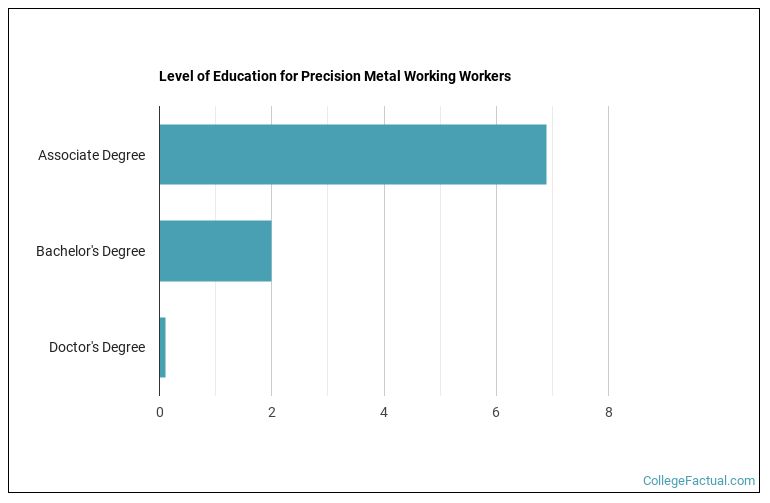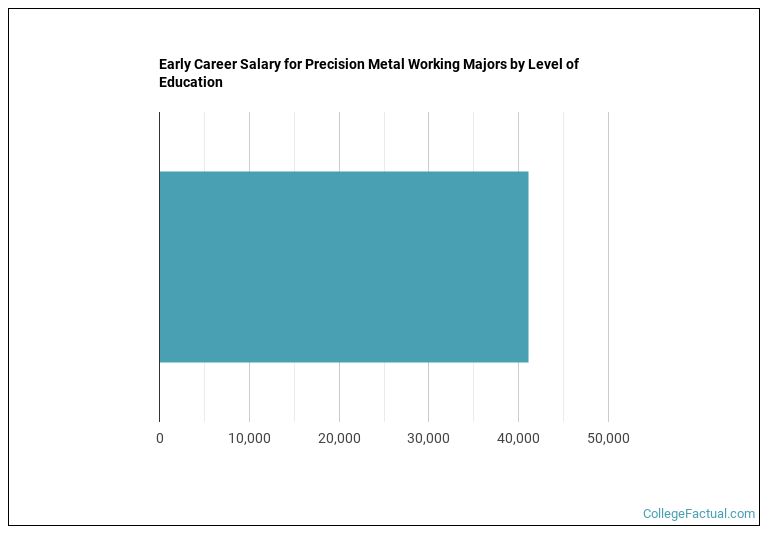 by our College Data Analytics Team
by our College Data Analytics TeamAn individual who studies Precision Metal Working will gain the technical knowledge and skill to create products and structures using metals. There are many different concentrations within this major; some of them are Machine Tool Technology, Machine Shop Technology, Sheet Metal Technology, Welding Technology, Tool and Die Technology, Ironworking, Computer Numerically Controlled Machinist Technology, and Metal Fabricator.
While focusing on these concentrations you will be taking courses in welding, metalworking, shop mathematics, mechanical drawing, physics, and chemistry. This major is commonly offered as a certification or Associate's degree.
In 2021-2022, precision metal working was the 131st most popular major nationwide with 54,790 degrees awarded. Our 2025 Best Precision Metal Working Schools ranking analyzes 78 of these schools to determine the best overall colleges for precision metal working students. Explore this or one of our many other custom precision metal working rankings further below.
This program requires a lot of hands-on work and attention to detail. Students should possess physical stamina and strength in order to guide and load heavy materials and parts. Computer skills are needed for many aspects of the job, as well as the ability to read blueprints.
Most programs include a work apprenticeship in order for students to gain essential work experience. You will work alongside professionals in the field, as well as spend time studying and in the classroom.
precision metal working degree applicants generally need have finished high school or their GED. Many schools may also have GPA and SAT/ACT score minimums that must be met. In addition to these basic precision metal working program qualifications, to serve in some precision metal working careers, special certification may be required outside of your degree.
There are many different precision metal working degree levels. You can spend many years getting as high as a in precision metal working to something that takes less time like a . How long it takes to complete some common precision metal working degree levels is shown below.
| Degree | Credit Requirements | Typical Program Length |
|---|---|---|
| Associate Degree | 60-70 credits | 2 years |
| Bachelor’s Degree | 120 credits | 4 years |
| Master’s Degree | 50-70 credits | 1-3 years |
| Doctorate | Program required coursework including thesis or dissertation | At least 4 years |
An associate degree is the most common level of education achieved by those in careers related to precision metal working, with approximately 4.9% of workers getting one. People currently working in careers related to precision metal working tend obtained the following education levels.
| Level of Education | Percentage of Workers |
|---|---|
| High School Diploma | 51.6% |
| Post-Secondary Certificate | 24.6% |
| Less than a High School Diploma | 9.7% |
| Some College Courses | 7.8% |
| Associate’s Degree (or other 2-year degree) | 4.7% |
The chart below shows what degree level those who work in precision metal working have obtained.

The education level required is different depending on the precision metal working career you are seeking.
Individuals who have completed a program in Precision Metal Working have a few different career options available to them. Structural iron and steel workers install girders, steel beams, and columns to form bridges, buildings and other structures. Another job highly in demand is sheet metal workers. These professionals install and develop products that are made from thin sheets of metal. Other jobs graduates go into are welders, cutters, solderers, and brazers, machinists, and tool and die makers.
Want a job when you graduate with your precision metal working degree?
The following options are some of the most in-demand careers related to precision metal working.
| Occupation Name | Projected Jobs | Expected Growth |
|---|---|---|
| Welders, Cutters, Solderers, and Brazers | 427,300 | 5.6% |
| Machinists | 404,100 | 2.0% |
| Metal and Plastic Cutting, Punching, and Press Machine Setters, Operators, and Tenders | 175,900 | -8.7% |
| Sheet Metal Workers | 150,900 | 8.6% |
| Machine Tool Operators | 147,300 | 1.1% |
Precision Metal Working graduates between <nil> reported earning an average of $33,614 in the <nil> timeframe. Earnings can range from as low as $15,982 to as high as $68,852. As you might expect, salaries for precision metal working graduates vary depending on the level of education that was acquired.

Salaries for precision metal working graduates can vary widely by the occupation you choose as well. The following table shows the top highest paying careers precision metal working grads often go into.
| Occupation Name | Median Average Salary |
|---|---|
| Metal and Plastic Model Makers | $56,920 |
| Computer Numerically Controlled Machine Tool Programmers | $56,300 |
| Tool and Die Makers | $53,650 |
| Sheet Metal Workers | $52,710 |
| Metal and Plastic Layout Workers | $47,380 |
With over 3,179 different precision metal working degree programs to choose from, finding the best fit for you can be a challenge. Fortunately you have come to the right place. We have analyzed all of these schools to come up with hundreds of unbiased precision metal working school rankings to help you with this.
One of 5 majors within the Precision Production area of study, Precision Metal Working has other similar majors worth exploring.
| Major | Annual Graduates |
|---|---|
| Welding Technology/Welder | 46,029 |
| Machine Tool Technology/Machinist | 3,181 |
| Computer Numerically Controlled (CNC) Machinist Technology/CNC Machinist | 2,275 |
| Machine Shop Technology/Assistant | 1,588 |
| Tool & Die Technology/Technician | 541 |
| Related Major | Annual Graduates |
|---|---|
| Woodworking | 435 |
| Other Precision Production | 67 |
| Leatherworking & Upholstery | 46 |
| Precision Production Trades | 44 |
| Boilermaking | 29 |